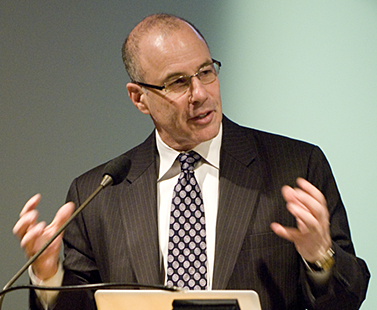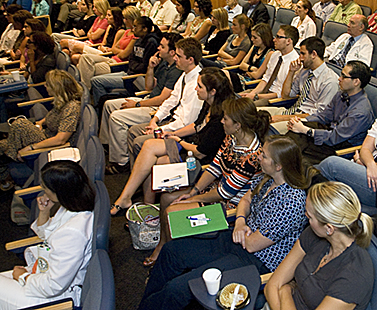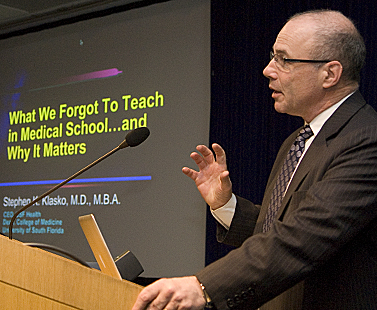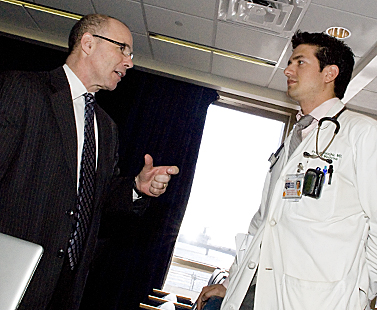Get ready for change, says Dr. Klasko
Doctors need to learn to embrace change, Dr. Stephen Klasko told a group of colleagues Thursday when he delivered a grand rounds lecture sponsored by the USF Department of Pediatrics.
As a group, doctors tend to fear change and have done too little to tackle leadership roles, he said in a talk entitled, “What We Forgot to Teach in Medical School…And Why It Matters.”
“We don’t get ready for change,” said Dr. Klasko, dean of the USF College of Medicine and CEO of USF Health.

Those characteristics have broad implications for health care policy and health care reform. He described to the group how, in the 1980s when rising health care costs began hurting the American economy, doctors passed up the opportunity to reform health care, essentially ceding control to the insurance companies who developed managed care.
The question now, Dr. Klasko said, is how doctors will respond as health care reform changes today’s landscape. As an Ob/Gyn, Dr. Klasko jokingly compared the effects of health care reform to what he tells patients who are about to give birth.
“It’s going to be long. It’s going to be painful,” he said, “And you won’t really know how you did for 21 years.”

As they face this change, doctors “are not like other people,” Dr. Klasko said. But society’s view of doctors has changed. The old ideal was Marcus Welby: the superhuman doctor who could tackle any medical problem and still make it to church at the end of the day.
Today’s version? Dr. Klasko pointed to a slide with the stars of “House” and “Grey’s Anatomy.”
“You’d think we were narcissistic, drug-addicted, sex-addicted folks,” he joked.
While they may not resemble their TV counterparts, the newest generation of doctors say they do have flaws: they haven’t learned everything they need to know.
In one survey, Dr. Klasko said, more than 60 percent of new doctors said medical school didn’t teach many of the real-life skills they needed. Among them: how to negotiate; how to communicate effectively; how health care financing works; how to market themselves, their practices and their departments; and, most of all, how to make their patients happy.
In some ways, Dr. Klasko said, doctors share certain traits. That’s partly because they’re chosen that way. Medical students are selected because of their science GPA, MCAT scores and organic chemistry grades.
“Then we wonder why they’re not empathetic and creative,” he said.
That’s one of the areas where he thinks USF’s admissions committee and students excel, he added.
“I’m very, very proud of our students,” he said. “They do great things.”

Still, as a group, most doctors are trained to value autonomy, hierarchy and scientific certainty. Dr. Klasko described one study asking MBAs and MDs about creativity. MBAs were far more likely to view themselves as being creative, as well as to practice such creative hobbies as cooking and painting.
The ultimate result, Dr. Klasko argued, is that people who feel creative feel more empowered to change things – while doctors are more likely to describe their lives as being affected by external factors that they can’t control.

Changing that profile is one reason why USF’s partnership with Lehigh Valley Health Network is so important, Dr. Klasko said. It will train a generation of doctors who are ready to lead.
As he described some of the changes likely to occur as health care reform and economics remake the health care system, Dr. Klasko said doctors need to develop that outlook.
“This is a revolution,” Dr. Klasko said. “Whether we’re leading it is the only question.”
— story by Lisa Greene, photos by Eric Younghans, USF Health Communications

